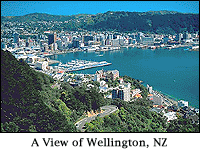 At least in New Zealand you don't have to work as hard as you do in the US.
They start vacations with 3 weeks a year and are often 4 weeks. That's very
good. The US could learn something from that. The entire country takes a
vacation from Christmas through January. No one plans to get anything done
and a lot of people just go to the country for 3-4 weeks. Businesses,
government, schools and special interest groups just don't plan anything for
that time. It is high summer and the kids are on vacation. Small businesses
just
close up for a few weeks.
At least in New Zealand you don't have to work as hard as you do in the US.
They start vacations with 3 weeks a year and are often 4 weeks. That's very
good. The US could learn something from that. The entire country takes a
vacation from Christmas through January. No one plans to get anything done
and a lot of people just go to the country for 3-4 weeks. Businesses,
government, schools and special interest groups just don't plan anything for
that time. It is high summer and the kids are on vacation. Small businesses
just
close up for a few weeks.
People really value their leisure time and there are a lot of 3-day weekends
in the first half of the year. Each major city has an anniversary day where
everything closes in that city for a day. To hell with the rest of the
country.
Shops in the city close at 5 or 5:30 pm and may have one evening where
they are open until 7 pm. When I first got here in 1991, supermarkets
closed at 2 pm on Saturday and were closed on Sunday. Now they are
open 8 am - 10 pm, 7 days a week.
Everyone (except me) has memories of bars closing at 6 pm and workers going to the pub -- swilling as much as possible between 5 and 6 pm -- and then staggering home.
Even in a work situation, it is socially acceptable to say "Enough...I'll just leave it here" (or
stay
with this idea or thought for now) and digest it --
instead of always "more, more, more" as in the US. It is even okay to say
"I've put it in the 'too hard' basket," which, in the US, is tantamount to
saying "I'm too dense to figure it out." You might think it or do it, but
you wouldn't say it.
NZ'ers wait to be noticed or waited on (like sheep) and, in the US,
they never would get noticed or waited on. They also feel that one of the
worst things that can happen is to "call attention to yourself." They have
a
"tall poppy" syndrome in schools where it isn't cool to stand out or up
above others. No wonder they aren't known to be competitive.
It takes a long time for cars to go through a green light. It takes
3 cars compared to, say, 8 or 9 in New York City. They are not in a hurry (except on the curvy
and
dangerous open highways). Also, until recently, it was considered a luxury
to have power steering. It takes them a long time to turn a corner. My
1983 Mitsubishi Sigma Station wagon (which was a luxury car in its day),
doesn't have it. It took a lot of upper body strength for me to drive it at
first. It was quite dangerous on the very windy roads they have here.
Almost everyone owns their own home, including clerks in a
shop and people who are receiving unemployment benefit or "the dole."
The homes aren't heated centrally and there are usually electric heaters
on in the room you are currently occupying. There are a lot of "do it
yourselfers" and a willingness to put something together with No. 8 wire.
The pioneer spirit is within the older generation's memory and food isn't
always refrigerated.
There are no snakes and very few bugs like mosquitoes or "mozzies"
(rhymes with "Aussies"), although I have met a few wicked biting black flies when
tramping in the bush. People still walk in their neighborhoods in the
evening.

